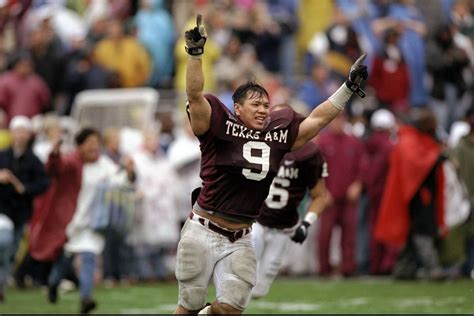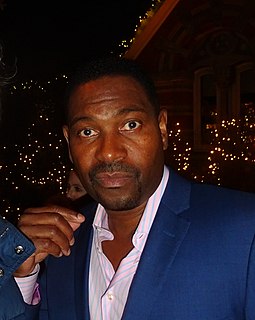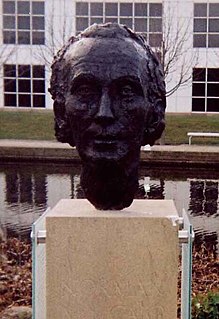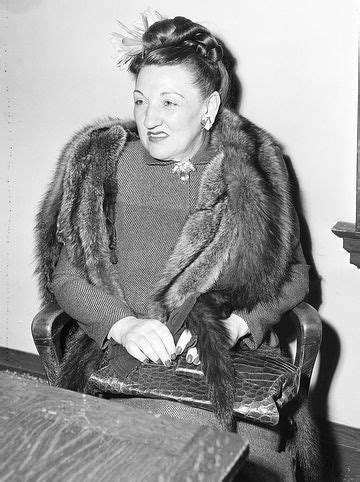A Quote by Dat Nguyen
We moved to a town that's predominately Caucasian, some Hispanic and one or two black families, and they do shrimping for a living. Here come hundreds of Vietnamese doing the same occupation. So there was a lot of tension because people were saying we were taking money, shrimp, fish or whatever it is.
Related Quotes
Anyway, like I was saying, shrimp is the fruit of the sea. You can barbecue it, boil it, broil it, bake it, sautes it. There's, um, shrimp ka-bobs, shrimp creole, shrimp gumbo, pan-fried, deep-fried, stir-fried. There's pineapple shrimp, lemon shrimp, coconut shrimp, pepper shrimp, shrimp soup, shrimp stew, shrimp salad, shrimp and potatoes, shrimp burger, shrimp sandwich... That's, that's about it.
I just came back from - with Trump when I endorsed him in Iowa, in Marshalltown, a little town - 27,000 - have a lot of Hispanics working there from Mexico in a private business, so they're still here. I'm not saying they're here illegally but they still come and they work, make money for their families, send the money back to Mexico or whatever, so it's a big problem.
We look at the African-American community, for a long time those of us who be considered strong - black men - for whatever reason, haven't done a good job of taking care of the weak. And we were doing things that render taking care of our youth and taking care of our women and our families impossible, when our lives are taken.
The earthquake in Haiti was a class-based catastrophe. It didn't much harm the wealthy elite up in the hills, they were shaken but not destroyed. On the other hand the people who were living in the miserable urban slums, huge numbers of them, they were devastated. Maybe a couple hundred thousand were killed. How come they were living there? They were living there because of-it goes back to the French colonial system-but in the past century, they were living there because of US policies, consistent policies.
When some people look at a shrimp they think, "Hmm. Delicious." When I look at a shrimp I think, "You're a miracle, absolutely incredible. Your ancestors have gone back hundreds of millions of years." And to develop a thing as simple as a shrimp cocktail, you have to calculate the hundreds of millions of years that have preceded that moment where you're sitting there with your sauce and fork poised.
It's easier to keep your stuff then it is to expose it, because some people don't get it. At the cross, at the feet of Jesus, there were some people who said, "Good! I'm glad that you're dead." Then there were some that were crying and saying, "Why are you doing this to this innocent man?" It is not easy to do.
When my family first moved to Hempstead in the 1960s, they were one of the first black families. It used to be an all-white neighborhood, but there was white flight when the black people with money started moving in. When I was, like, 13 or 14, Hempstead had just become all black, and the poverty became worse and worse.
There where hundreds of graves. There where hundreds of women. There were hundreds of daughters. There were hundreds of sons. And hundreds upon hundreds upon thousands of candles. The whole graveyard was one swarm of candleshine as if a population of fireflies had heard of a Grand Conglomeration and had flown here to settle in and flame upon the stones and light the brown faces and the dark eyes and the black hair.
I won Iowa not because the demographics dictated that I would win Iowa. It was because I spent 87 days going to every small town and fair and fish fry and BFW Hall, and there were some counties where I might have lost, but maybe I lost by 20 points instead of 50 points. There's some counties maybe I won, that people didn't expect, because people had a chance to see you and listen to you and get a sense of who you stood for and who you were fighting for.
There are a lot of black men doing really well, taking care of their families, taking care of their wives, being successful, doing the right thing, promoting the right thing. There needs to be an evolution in our portrayal. We have to come together, pool our resources and tell our own stories. People won't respect us unless we make them.
A lot of my friends were mostly working in black-and-white-people like Lee Friedlander, Diane Arbus, Garry Winogrand, and others. We would exchange prints with each other, and they were always very supportive of what I was doing. What each of us was doing photographically was entirely different, but we were basically coming from the same place, sort of like a club.






































